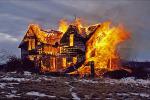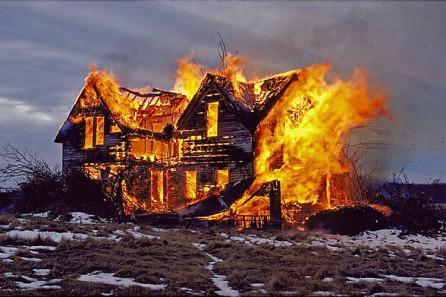
and National Clam Chowder Day, the day Samuel Colt was granted a United States patent for the Colt revolver in 1836, miners in Calaveras County, California, discover what is now called the Calaveras Skull in 1866 (human remains that supposedly indicated that man, mastodons, and elephants had co-existed), the first Pan American Games are held in Buenos Aires, Argentina in 1951, and is the birthday of Giovanni Battista Morgagni, Italian anatomist in 1682 (considered the father of anatomical pathology).
Ok, on to the burning house...

If you walk out your door and notice it's warm or even hot outside, would you immediately install whole house sprinklers and turn them on to prevent your house from burning down? Probably not. In fact it would be a tremendous waste of water and a bit destructive to water down your house inside and out if it wasn't actually on fire.
So why do we do the equivalent when it comes to cholesterol, heart disease and statins?
Having a high cholesterol score and thinking that it means you're at risk for a heart attack is the same as walking out your front door, noticing it's hot outside and concluding that your house is going to burn down from a forest fire.
Taking a statin when it's just a cholesterol issue is like turning sprinklers on your house to prevent it from burning down. Might it work? Yes. Is it smart to do if your only clue was it's hot outside? No. There's so much more you would do before concluding your house is in jeopardy.
Taking blood work is like walking outside to check things out.
Checking cholesterol levels is like simply seeing how hot it is outside. Is it hot? Which is perfectly normal, as temperature (cholesterol) fluctuates. Is it really hot (which is entirely possible, particularly with global warming)? Is it hotter than it's ever been? Is it scary hot? Is it searing your skin hot?
If your house is about to burn down then it will likely be pretty hot when you walk outside. But it's not guaranteed. There's hot days with no fire in sight. And there's also this common situation: you walk out the front to check and it seems fine, maybe even a bit on the cool side. Maybe there's snow on the ground like in the picture above. So you feel good about your chances and go inside for a nap. Unfortunately, there's a 50/50 chance a fire is in your back yard or starts inside your house, (people with low cholesterol can have heart attacks) so if you were only looking at the outside temperature (cholesterol) and not other clues (smoke, crackling sound, flammable materials, old wiring) you might be caught off guard and your heart attack "comes out of nowhere" and burns part or all of your house down.
What else could you look at for better clues about your fire risk?
Do you smell smoke? Blood pressure high?
Is there dry brush around? Blood sugar high?
Do you hear a crackling sound? Triglycerides high?
Can you see a fire in the distance? General inflammation in the body (high CRP)?
Is there a fire in your front yard? Arterial inflammation markers?
Can you see evidence of charring/burn in your yard or house? Plaque buildup?
Is there a breeze? Family history for/against?
Some scenarios...
If you walk outside and you see a fire or smoke in the distance (elevated CRP and/or blood pressure) but no breeze then you take notice but don't panic. It could be a campfire in the distance (normal inflammatory response from a cold, exercise, etc.) that will likely go out on its own soon.
If you notice the fire getting bigger and/or closer (higher CRP) then you start paying attention.
If you walk outside and it's cool (low cholesterol) but you smell smoke (high blood pressure), hear crackling sounds (high triglycerides) and notice lots of overgrown brush (high blood sugar) I highly suggest you check your entire yard for fire (heart inflammatory markers) or charred spots (plaque build up) very quickly.
If you feel immense heat when you walk outside (high cholesterol), there's a fire close to your yard (arterial inflammation) and the winds blowing your direction (family history of heart disease then you better take some quick action. Get your weed wacker out and clear the brush (lower blood sugar) and work on putting out the fire while you can (cooling inflammation through lifestyle adjustments). You could start hosing down your house (taking a statin) but that won't prevent the existing fire from burning. It might delay it but it doesn't actually halt the fire's progress or fuel.
My situation is similar to many of you out there. With a family history of heart disease, I in essence live in a breezy environment. This means that if I notice it's hot outside then I note that but don't panic. I look at all the other clues available to me. If I see no evidence of any fire near or far and keep my house and yard cleared of brush, then I feel at ease. Granted, it's smart keep a little closer eye out on my surroundings and environment than someone who lives in a place without a breeze but I know I shouldn't start hosing down my house just because it's breezy and/or its hot outside. As mentioned before, half of our houses burn down when it's cold outside so I think it's smart to keep a well rounded approach to assessing your fire risk.
A couple of thoughts:
The medical model now is that a cholesterol level over 200 means it's hot enough outside to think there's a fire closing in. That's the equivalent of saying its 75 degrees outside so there must be a fire burning in my yard. Get the hose and sprinklers out.
If you start constantly using sprinkler system (taking a statin) just because it's "hot" or breezy outside you just might be working against what your house (body) is trying to do. Your house has a thermostat set to a ideal temperature. Using a hose or sprinklers to cool off your house just might trigger the inside heat to come (more internal cholesterol production) to balance out you trying to cool off. We also don't know at what energy cost this comes with or how using all this water to wet the house down affects other systems in the house (statin side effects). The body doesn't work in isolation so we need to think systemically when addressing an issue or body process.
Be a good detective. Don't jump to conclusions based off just one clue. Do your homework, look closely at the clues around you, explore your property and manage your controllable environment before you just start wasting water.
Thank for reading, have a great day!
Categories: Cholesterol, Health & Wellness, Human Function, Perspective, Research | Tags: are statins necessary, cholesterol, cholesterol analogy, health, heart disease, overreaction, statin, statins | Permalink.


